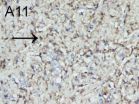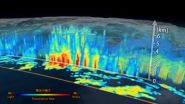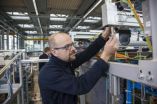(Press-News.org) The popular TV series "CSI" is fiction, but every day, real-life investigators and forensic scientists collect and analyze evidence to determine what happened at crime scenes. In a study published in the ACS journal Analytical Chemistry, scientists say they have developed a more rapid and accurate method that could allow crime scene investigators to tell what kind of ammunition was shot from a gun based on the residue it left behind.
Igor K. Lednev and Justin Bueno point out that when someone fires a gun, burnt particles from the bullet spray out of the weapon onto a shooter's hand, clothes, furniture and other surfaces nearby. The presence or absence of that residue says whether a gun was discharged and — based on its location on clothing and other surfaces — who and what was near the weapon when it was fired. But current analysis methods can only re-create a crime scene story in hazy detail. The most widely used technique today specializes in detecting the heavy metals that some ammunition contains. Newer bullets, however, aren't necessarily made with heavy metals, making analyses much more difficult. Also, existing methods require expensive equipment and a lot of time, luxuries law enforcement can't afford. To bring real-life CSI closer to what's hyped on TV, Lednev's team set out to find a new way to trace the ammunition used in a crime.
They developed a novel approach to improve gunshot residue "fingerprinting" that can rapidly detect a wider range of particles than existing methods. "Therefore the ability to detect these chemicals may indicate that a specific ammunition brand was discharged (or was not) during a shooting incident," the researchers state, adding that their work could also have applications in the fields of homeland security and counter-terrorism.
INFORMATION:
The American Chemical Society is a nonprofit organization chartered by the U.S. Congress. With more than 161,000 members, ACS is the world's largest scientific society and a global leader in providing access to chemistry-related research through its multiple databases, peer-reviewed journals and scientific conferences. Its main offices are in Washington, D.C., and Columbus, Ohio.
To automatically receive news releases from the American Chemical Society, contact newsroom@acs.org.
Follow us: Twitter | Facebook
Real-life CSI: What can investigators really tell from gunshot residue?
2014-03-26
ELSE PRESS RELEASES FROM THIS DATE:
Electroacupuncture at Conception and Governor vessels and hUCB-MSCs for cerebral ischemia
2014-03-26
Mesenchymal stem cell transplantation is a novel means of treating cerebral ischemia/reperfusion, and can promote angiogenesis and neurological functional recovery. Acupuncture at Conception and Governor vessels also has positive effects as a treatment for cerebral ischemia/reperfusion. Therefore, Prof. Haibo Yu and co-workers from Affiliated Shenzhen Traditional Chinese Medicine Hospital, Guangzhou University of Chinese Medicine in China hypothesized that electro-acupuncture at Conception and Governor vessels plus mesenchymal stem cell transplantation may have better therapeutic ...
Beer marinade could reduce levels of potentially harmful substances in grilled meats
2014-03-26
The smells of summer — the sweet fragrance of newly opened flowers, the scent of freshly cut grass and the aroma of meats cooking on the backyard grill — will soon be upon us. Now, researchers are reporting that the very same beer that many people enjoy at backyard barbeques could, when used as a marinade, help reduce the formation of potentially harmful substances in grilled meats. The study appears in ACS' Journal of Agricultural and Food Chemistry.
I.M.P.L.V.O. Ferreira and colleagues explain that past studies have shown an association between consumption of grilled ...
Research produces strong evidence for a new class of antidepressant drugs
2014-03-26
Scientists have shown for the first time that a chemical in the brain called galanin is involved in the risk of developing depression.
And the research, undertaken by a European research team, points to a strong reason to develop drugs that modify galanin functioning as a new class of antidepressant drug.
Galanin is a neuropeptide (a small protein) that was discovered and investigated over 30 years ago by various groups including the Swedish scientist Tomas Hokfelt. He is one of the senior authors of the paper published in the journal PNAS.
Professor Hokfelt and ...
First images available from NASA-JAXA global rain and snowfall satellite
2014-03-26
NASA and the Japan Aerospace Exploration Agency (JAXA) have released the first images captured by their newest Earth-observing satellite, the Global Precipitation Measurement (GPM) Core Observatory, which launched into space Feb. 27.
The images show precipitation falling inside a March 10 cyclone over the northwest Pacific Ocean, approximately 1,000 miles east of Japan. The data were collected by the GPM Core Observatory's two instruments: JAXA's Dual-frequency Precipitation Radar (DPR), which imaged a three-dimensional cross-section of the storm; and, NASA's GPM Microwave ...
The advantages of entering the workforce in a recession
2014-03-26
Despite the well-documented disadvantages of graduating from college during a recession, could graduates actually be happier with their jobs in the long run?
A new article from Administrative Science Quarterly examines whether earning a college or graduate degree in a recession or an economic boom has lasting effects on job satisfaction. Across three studies, well-educated graduates who entered the workforce during economic downturns were happier with their work than those who first searched for jobs during more prosperous times. In fact, they were happier with their ...
Immunotherapy data heralds new era of lung cancer treatment
2014-03-26
Geneva, Switzerland, 26 March 2014 -- A new era of lung cancer therapy is close to dawning, using drugs that can prevent tumour cells from evading the immune system, experts have said at the 4th European Lung Cancer Congress.
For decades, scientists and doctors thought immunotherapy –treatments that harness the immune system to fight a disease-- was of marginal benefit in lung cancer, says Jean-Charles Soria, Institute Gustave Roussy in Paris, France.
However a new class of drugs known as "immunocheckpoint regulators" have shown huge potential, Soria says. New data ...
Planning and building products and production plants simultaneously
2014-03-26
In early 2010, LANXESS decided to enter a new field of business, water purification: A production facility for Lewabrane reverse osmosis membrane filter elements was supposed to be built by the fall of 2011. Together with the company's experts, researchers from the Fraunhofer Institute for Factory Operation and Automation IFF in Magdeburg designed and had the manufacturing technology ready for production in just nine months. Afterward, they built a second, fully automatic and, therefore, more complex plant in just one year. Part of this plant – scaled down – will be on ...
Harvard scientists visualize new treatments for retinal blindness
2014-03-26
A new report published online in The FASEB Journal may lead the way toward new treatments or a cure for a common cause of blindness (proliferative retinopathies). Specifically, scientists have discovered that the body's innate immune system does more than help ward off external pathogens. It also helps remove sight-robbing abnormal blood vessels, while leaving healthy cells and tissue intact. This discovery is significant as the retina is part of the central nervous system and its cells cannot be replaced once lost. Identifying ways to leverage the innate immune system ...
Genetics can explain why infections can trigger rheumatoid arthritis
2014-03-26
A new international study has revealed how genetics could explain why different environmental exposures can trigger the onset of different forms of rheumatoid arthritis.
A team at the Arthritis Research UK Centre for Genetics and Genomics at The University of Manchester, part of a large international consortium involving scientists from across 15 academic institutions, believe their findings could have important implication for the way that rheumatoid arthritis is diagnosed and treated.
Publishing their findings in the journal American Journal of Human Genetics, they ...
New septic shock biomarker test could boost better interventions
2014-03-26
CINCINNATI – Septic shock is a severe systemic infection and major cause of death for the old and young alike. Unfortunately, researchers say testing new drug regimens to stop the infection is confounded because clinical trials include patients who are either too sick to be saved by experimental therapies or not sick enough to warrant the treatments.
In a study published in the April edition of Critical Care Medicine, researchers at Cincinnati Children's Hospital Medical Center and the University of Cincinnati report a new blood test that helps solve the dilemma by identifying ...


